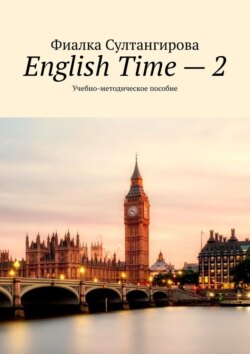Читать книгу English Time – 2. Учебно-методическое пособие - Фиалка Султангирова - Страница 4
Занятия №№3—4. 1. Настоящее продолженное время (утвердительные предложения). 2. Работа с картинками (задания №№6 и 3 ВПР)
Оглавление1. Настоящее продолженное время.
Образование утвердительных предложений в настоящем продолженном времени.
Настоящее продолженное время употребляется, когда речь идет о событиях, которые происходят в данный момент (сейчас).
Слова-маркеры настоящего продолженного времени:
now – сейчас
at the moment – в данный момент
still – все еще
Look! – Посмотри!
Listen! – Послушай!
Правило образования:
За подлежащим, выраженным местоимением или существительным, идет вспомогательный глагол to be и основной глагол с окончанием -ing.
I + am + Ving
He / She / It + is + Ving
We / You / They + are + Ving
Например:
I am dancing now. – Я танцую сейчас.
He is dancing now. – Он танцует сейчас.
They are dancing now. – Они танцуют сейчас.
Есть некоторые правила:
– У глаголов, заканчивающихся на — e, уходит конечная гласная:
come – coming (приходить),
make – making (делать),
write – writing (писать).
– У глаголов, заканчивающихся на — ie, гласные — ie заменяются на — y:
lie —lying (лежать),
tie – tying (завязывать),
die – dying (умирать).
– Если короткий глагол заканчивается на гласную с согласной, тогда эта согласная удваивается:
– swim – swimming (плавать),
stop – stopping (останавливаться),
get – getting (получать).
Примечание:
Глаголы, выражающие чувства восприятия и умственную деятельность в данном времени не употребляются.
to want – хотеть,
to like – нравиться,
to love – любить,
to wish – желать,
to see – видеть,
to hear – слышать,
to feel – чувствовать,
to notice – замечать,
to remember – помнить,
to recognize – узнавать,
to forget – забывать,
to seem – казаться,
to be – быть
УПРАЖНЕНИЯ
Упражнение 1. Вставьте нужную форму вспомогательного глагола BE (am, is, are) в предложения. Переведите их на русский язык.
1. I __________reading a book.
2. We _________drinking coffee.
3. They _______ baking a cake.
4. She ________looking through the window.
5. He ________helping about the house.
6. You __________ watching TV.
7. Grandpa _________reading a newspaper.
8. The kitten _________sleeping.
Упражнение 2. Переделайте предложения так, чтобы глаголы стояли в Present Continuous.
1. I (close) the door.
2. The puppy (sleep) on the mat.
3. The bоуs (write) letters.
4. We (sing) songs.
5. Mother (make) a pie.
6. The bell (ring).
7. The man (drive) a car.
8. You and your brother (play) football.
Упражнение 3. Поставьте глаголы в скобках в Present Continuous.
1. It (rain) all day.
2. I (play) the piano now.
3. Diana (drink) tea.
4. The boy (climb) the tree.
5. The baby (drink) milk.
6. My friends (speak) English.
7. We (read) a magazine.
8. You (write) a letter to your friend.
2. Работа с картинками.
План описания картинки.
1. I’d like to describe a picture number…
2. The picture shows us …a nice/ hot/cold/warm /rainy summer/winter/spring/autumn day.
3. The photo was taken outside/inside.
4. The action is taking place at school/at home/ in the supermarket/in the park/in the gym/in the café/in the city center/in the countryside.
5. In the picture I can see… a boy/a girl/a woman/a man/a child/boys/girls/ city/monument/ house/Big Ben/ bridge/nature/landscape
6. The boy/the girl/the woman/the man/the child/boys/girls/ city/monument/ house/Big Ben/ bridge/nature/landscape looks/look nice/great.
7. He/ She has got dark/ fair hair. He/ She has got brown/blue/green eyes.
(The building is old/modern and high/low. It is very pleasant to look at.
The landscape is beautiful. Everything is green/white with snow and peaceful. The picture is very vivid.)
8. He/ She is wearing a dress, a T-shirt/a shirt/jeans/a skirt/ a jacket/trousers…
9. The boy/the girl is reading a book/playing a computer game/ watching TV/cooking/ playing tennis/playing hockey/ watching video/ flying on a plane/playing football/ relaxing.
10. In the background there are trees/…
11. I like the picture, because it’s full of positive emotions and reminds me of school/summer/holidays/ my trip to London/ my granny/ my friends/ my childhood.
12. Besides I like to read/… too.
Задание №6 ВПР: Прочитайте текст и вставьте вместо каждого пропуска подходящее слово, выбрав его из выпадающего списка. Два слова в списке лишние.
1. I’d like to describe a picture number…
2. The picture shows us a very nice autumn day.
3. The photo was taken outside.
4. The action is taking place in the A ______yard.
5. In the picture I can see a woman.
6. The woman looks nice.
7. She has got short B _______hair.
8. She is wearing a coat, C _____trousers and white and black trainers.
9. The woman is cleaning the D ________.
10. I guess she is concentrated.
11. In the background there is a building.
12. I like the picture, because it’s E ______of positive emotions.
1. full; 2. path; 3. around; 4. school 5. back; 6. dark; 7. black.
Задание 3 ВПР: Выберите фотографию и опишите ее. У вас есть полторы минуты на подготовку и не более двух минут для ответа. У вас должен получиться связный рассказ (7—8 предложений).
План ответа поможет вам:
– the place
– the action
– the appearance of the person
– whether you like the picture or not
– why
Start with: «I’d like to describe picture № …. The picture shows…»
